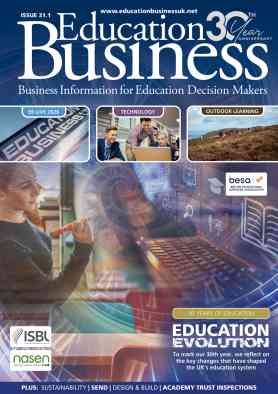
Being part of something bigger
The debate around academies tends to focus on the potential shortcomings without always considering some of the benefits. Liz Anderson, chief executive officer of the Djanogly Learning Trust, shares her experience of the advantages to being part of a multi academy trust
Academisation and the growth of multi academy trusts are contentious issues in the education sector.
Critics argue that the process is driven by the political agenda instead of what is best for pupils, staff, parents and carers and local communities. Whilst there are some legitimate concerns, the public debate tends to focus on the potential shortcomings without always considering some of the benefits.
In my experience, there are plenty of advantages to being part of a multi academy trust, which include a positive impact on culture, good practice, professional development, recruitment and retention and finance from working together as a family of academies, each of which I will explore in turn.
Culture
We believe that every child has a right to an education that gives them the best opportunity to succeed. We have a shared ethos to be innovative in order to improve, to develop resilience in order to face challenges, and to strive for excellence in everything we do.
We strive to foster a culture where all staff feel valued and believe in what we are doing and why. At our Trust, which sponsors seven schools in the East Midlands, it really does matters that all of our staff at each of our academies possess a sense of pride and belonging and that they see themselves as a part of the whole.
This also creates genuine and committed collaboration between academies and fosters a shared sense of accountability – Djanogly children are Djanogly children whichever academy they attend. Yet within that, each academy has a responsibility to be at the heart of the community they serve and to adapt what they do to overcome contextual barriers and engage their individual communities. It is not a top down and one size fits all approach. We are proud that our schools can and do keep their individual identities within our multi academy trust.
Sharing good practice
All our academies have a shared sense of purpose and are open minded to the sharing of good practice. At our monthly heads meeting, for example, all the heads share a success that they are proud of and a current challenge. Other heads always offer support and most of the time the solution is in the room – taking a model that works rather than re-inventing the wheel from scratch.
Academies can look at what others are doing, take it away and personalise it to their needs. There are also opportunities for staff at all levels in all roles to visit other academies in the Trust. We also collaborate with other trusts and schools to share ideas and practice that works.
Professional development
To be a successful teacher you have to start by making sure the children feel safe in your care. If they feel safe, they will be happy. If they are happy, they will learn.
As a leader, you have to make your staff feel safe and secure so that they open themselves up to develop as a professional and feel safe to be innovative and take risks to meet children’s needs. As a Trust you have a wider network to ensure that all staff feel safe and secure, and that they have opportunities to move forwards in their professional practice and careers.
Shared resources means that we can invest more time and money into professional development for staff in all roles at all levels. Our professional networks across the Trust give everyone a shared commitment and a real reason to collaborate.
We invest in training our own facilitators in key areas so that we can run our own continuing professional development programmes at no additional cost to individual academies. We also provide opportunities for staff to be part of cross-trust working parties to be innovative and engage in pilot projects to test and then disseminate more widely.
Staff recruitment and retention
Being part of a larger organisation is attractive to applicants and current colleagues, and helps to boost staff recruitment and retention. There are progression opportunities for individuals who want to advance their careers by moving within our Trust to take up promotions.
This sense of identity, our growing reputation from the positive changes and our journey of improvement, particularly during the last four years, has increased the number of staff applicants to our schools, which have previously found it hard to recruit.
I am a case in point, having worked my way up the ranks. I joined the Trust as head of a small primary in 2011 and then had the opportunity to turn around a previously struggling school. That school is now thriving and offering support to others who have subsequently joined us on our journey. We are extremely proud of what we are achieving in the East Midlands and the communities that we serve. Consequently, our reputation is growing and we are sharing our success by supporting other academies joining our Trust.
Applicants have told us that they want to work for our Trust and actively look out for our vacancies whichever academy it happens to be. One of our academies that, before joining our Trust, considered themselves fortunate to get two teacher applications, if any, for some years is attracting four or five times that amount now.
Finance
Finally, there are clear financial benefits to being part of a larger group, for example, we can negotiate group discounts so that all academies benefit from savings.
We share resources and are able to access shared funding for projects that need addressing sooner rather than later. We have an ability to benchmark across the Trust to ensure that we are using public funding wisely and getting best value for money. We have specialists centrally, for example, human resources, estates management and governance that all of our academies can draw on for support.
Summing up, our journey to excellence for our staff, pupils and our local communities is ongoing and we see being a multi academy trust as pivotal to that. Has it always been easy? Of course, not! Have we made a difference? Yes, absolutely. The improved outcomes across our Trust clearly evidence that as we have seen pupils in some of our academies, for example, achieving some of the best results in Nottingham. But our pride and success goes beyond test scores. Staff absence is significantly down, retention is up and more of our families are engaging with us.
Some of the best feedback that I have received is from staff previously sceptical of academisation, who have since said that joining our multi academy trust is the best thing that they ever did for their school and themselves. Staff are treated with respect and, in return, they want to do their best not only for the children but also for our Trust. They feel well supported. They do not feel that they are alone and know they have the appropriate backing when they need it. Most importantly, our children are happy, resilient, open minded, aspirational and ready for the next stage of learning.
Further Information:
Latest News
11/02/2026 - 10:53
The government has launched its new ten-year Education Estates Strategy, backed by £1 billion.
10/02/2026 - 09:47
Spending on schools across Scotland has increased by more than £1 billion in real terms over the past decade, statistics show.
10/02/2026 - 09:34
New training to empower school staff to improve mental health and wellbeing support for neurodivergent students has been launched by Anna Freud, a mental health charity transforming care for children and young people.
09/02/2026 - 09:58
Data from BAE Systems’ annual Apprenticeship Barometer found that 63% of parents said they would prefer their child to choose an apprenticeship over a degree after school.
06/02/2026 - 09:59
The work builds on guidance launched by Cardiff Council in autumn 2025, which provides clear and practical advice for schools responding to incidents where weapons are brought onto school premises.







